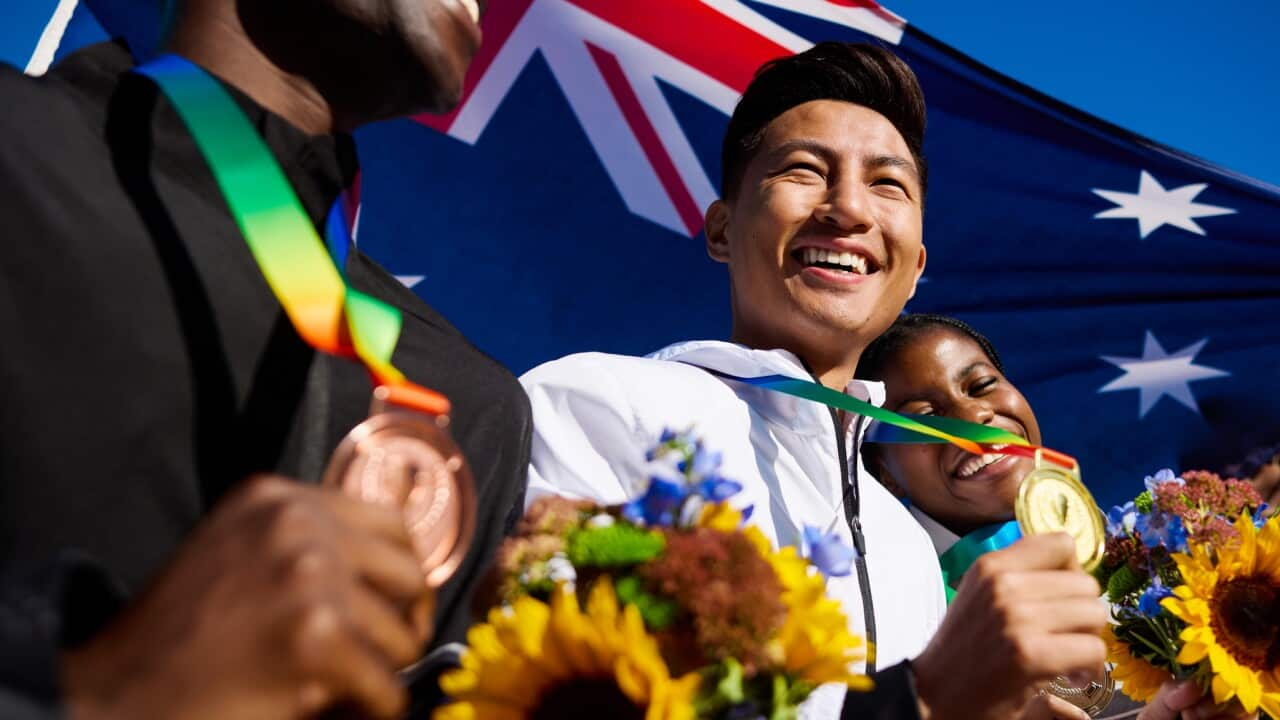akan membantu anda bertutur, memahami dan berkomunikasi dalam Bahasa Inggeris di Australia –
Episode kali ini sesuai untuk pelajar peringkat pertengahan. Setelah mendengar episode ini, sila uji pengetahuan anda melalui kuiz yang kami sediakan.
Nota Pembelajaran
Beberapa frasa yang boleh digunakan ketika anda bercakap tentang pesta sukan:
- That was epic! | That was legendary! | That was outstanding! - Amat mengagumkan / Kecermelangan tidak terperi / Paling hebat sekali
- They’re really going for gold! - Mereka mengejar pingat emas
- He just smashed another record! - Beliau berjaya memecah satu lagi rekod
- She’s in the running for three medals! - Beliau berpeluang memenangi tiga pingat
- Have you caught any track events yet? - Apakah anda berpeluang menyaksikan acara olahraga?
- I caught the 100m sprint. - Saya berpeluang menyaksikan acara lumba lari 100m
- It was crazy close! | It was a neck-and-neck game. | The race was down to the wire. - Saingan yang sengit sekali / Saingan paling hebat / Kesudahan yang hampir sama
- The winner just scraped in. | They made it by the skin of their teeth. - Pemenang menewas lawannya hanya dengan beberapa sa'at sahaja / Perbezaan yang tipis di antara juara dan naib-juara
Fokus Pembelajaran:
In British and Australian English, when we ask about the past we have to first decide whether we are asking in general or asking about a particular time so that we can choose which tense to use.
If I am asking a general question, we tend to use a tense we call the present perfect: Have + you +_ what we call past participle (seen, heard, caught etc.):
- Have you seen any track events yet? (i.e., don’t have any particular past event in mind, any event at any time will do)
But if we do have a particular time in our mind, we ask a question using a tense called the past simple: did + you + present form (see, hear, catch):
- Did you catch the news this morning? (i.e. the news that was broadcast this morning)
- Did you watch the 100m sprint (i.e. that one race)
Listen up to how people around you use these two different tenses and think about how it makes a different in meaning.
Ungkapan kolokial:
If an athlete smashes a record, they break it in a big way by doing better than anyone has done before. - memecah rekod
We say a race, or a game is crazy close when the competitors are very close, and it is not clear who will win. You could also say, ‘the runners were neck-and-neck’, or ‘The race was down to the wire’, and that would mean the same thing. - Ketiga-tiga ungkapan menggambarkan perlumbaan sengit yang melihat juara menewas saingan dengan margin yang tipis.
The winner just scraped in means that they just managed to win, but it wasn’t easy. - Memenangi sesuatu perlumbaan dengan catatan masa yang begitu tipis sekali.
‘By the skin of their teeth’ is also an expression used to describe a situation where someone only just manages to do something. - Memenangi sesuatu perlumbaan dengan catatan masa yang begitu tipis sekali.
Perbendaharaan:
To be up to something means to be doing something, but we often use it when people are doing something that is relaxing or even a little bit in naughty.
If something is epic it is so exciting that you won’t forget it.
When athletes achieve the best time or score, they set a new record.
A sprint is a short, fast race.
Maklumat Kebudayaan:
As Australians, we've been part of every modern Olympic Games. We've joined every Summer Olympics and most Winter Olympics. Sometimes, we even competed with New Zealand as Australasia. We were the first country in the Southern Hemisphere to host the games.
We hosted the Summer Olympics twice, in Melbourne in 1956 and in Sydney in 2000 when we finished 3rd and 4th in total medals. We'll host the Olympics again in 2032 in Brisbane. Many of our gold medals come from swimming, which is a very popular sport in Australia. We're also strong in field hockey, cycling, rowing, equestrian events, and sailing.
Transcript:
(Note: This is not a word-for-word transcript)
SBS acknowledges the Traditional Custodians of Country and their connections and continuous care for the skies, lands, and waterways throughout Australia.
Hi, I’m Josipa, and I’ve been thinking I should stop checking out what my friends in Europe are up to on social media. To be up to something means to be doing something, but we often use it when people are doing something relaxing or even a little bit naughty.
In this case, my friends aren’t being naughty, but they are having fun because it is summer over there and a lot of them are going to visit Paris for the Olympics. It's hard not to feel a little jealous when I see all of them having such a great time– the Mediterranean Sea, delicious seafood, beach parties, and their Paris travelling plans.
And it seems like almost everyone I know in Europe is going! Seriously, so many of my friends back home are even trying to learn some basic French for the Games.
I’ve always been a huge fan of the Olympic Games, because athletes from around the globe come together to compete in all sorts of sports like swimming, running, gymnastics, and a lot of other sports, too.
It’s really exciting stuff, and I really wish I could go. But since I can't, let me imagine it for a moment.
Come on, close your eyes and picture this: You step outside the house, and the summer breeze surprises you with the smell of a fresh croissant. As you walk down the street, passing tables with red and white chequered tablecloths, you hear the music coming from a nearby café. The sidewalks are bustling with people, laughter, and chatter filling the air. You can feel the excitement. Everywhere you look, national flags are decorating shops, TVs are playing sports matches and look, Allan and Clare are also here, and they’ve just finished watching the swimming race.
Claire
Wow, that was epic! We’re really going for gold in the swimming, aren’t we?
Allan
Totally! McKeown just smashed another record! She’s definitely in the running for three medals!
Claire
And have you caught any track events yet?
Allan
Yup, I caught the 100m sprint. It was crazy close! The winner just scraped in.
Whenever there’s a big global sporting event, I feel so lucky because I have two countries to cheer for. One is Australia, of course, and the other is the country where I was born, Croatia.
But no matter how much I love Australia and consider it my home, if I had to pick between supporting one or the other, my heart would probably choose Croatia first.
This realisation makes me feel a bit guilty, but I can’t help it. How about you? If you had to choose between supporting your home country or Australia in a sporting event, which country would you choose first?
Let's talk about it more a bit later, now we need to focus on our dialogue. Claire, first said,
Wow, that was epic!
If something is epic it is so exciting that it is unforgettable. You could also say, ‘That was legendary!’ or, if you were talking in a more formal context you could say, ‘That was outstanding!’
Claire also said,
We’re really going for gold in the swimming, aren’t we?
Claire said that the team were ‘going for gold’ meaning that they were putting in an enormous effort and hoped to win gold medals. We can also use this phrase in other areas of our life where we are making a huge effort and we want to achieve the best possible outcome.
Allan agreed because he replied,
McKeown just smashed another record!
When an athlete smashes a record, they break it in a big way by doing better than anyone has done before. They set a new, improved time or score. They set a new record. Allan also said,
She’s in the running for three medals!
This means that she has a good chance of winning three medals, so in the Olympic games, these could be gold, silver or bronze.
You could use the phrase 'in the running for' in a lot of different situations. For example, if it's very likely that you'll get promoted at work, I could say that you're in the running for a promotion, that is, to get a job at a higher level.
Or if your kid just joined the drama class, you could say that they're in the running for the lead role.
Remember how Claire asked Allan if he saw any track events. These are races or competitions on a running track? She said,
Have you caught any track events yet?
Have you caught any track events yet? The word 'caugh' is a past simple form of the word 'catch'. And, in this context, to 'catch' an event means to 'watch' or to 'see'.
The word 'catch' can be used in a lot of other situations, too. We can catch trains and buses, but also other less solid things.
For example, asking 'Did you catch the news this morning?' is the same as asking, 'Did you watch or listen to the news?'
And here’s an interesting (and rather tricky) thing about English in Australia: If we want to ask a question in general about whether someone has seen any track events, and we don’t mind which ones, we ask ‘have you caught any track events’ and we often add the word ’ yet’, but if we are asking about a very particular event in the past and we are referring to the definite time, we ask ‘did you catch any track events’ using a past simple form 'did'.
Tricky, huh? Anyway, back to the Olympics, Allan replied,
Allan
Yup, I caught the 100m sprint. It was crazy close! The winner just scraped in.
Let’s look into each part separately. First Allan said,
Yup, I caught the 100m sprint.
Allan caught the 100m sprint. ‘Caught’ is the past form of ‘catch ’For example, I could say, ‘I caught a great movie last night, which means that I watched a great movie last night.
Anyway, Allan saw the 100m sprint, that is a short race in track events where athletes run as fast as they can for 100 meters. And then he said,
It was crazy close!
We say something is crazy close when the competitors are very close, and it is not clear who will win. You could also say, ‘the runners were neck-and-neck’, or ‘The race was down to the wire’, and that would mean the same thing.
The winner just scraped in.
The winner just scraped in means that they just managed to win, but it wasn’t easy.
There are a lot of other ways to say that someone managed to do something even though it was very difficult, and you can use these expressions to talk about anything, not just sport.
For example, have you heard the expression, ‘by the skin of their teeth’?
This is a phrase we use when we want to say someone only just manages to do something.
Let’s say that Allan didn’t study for his university exam, but he still managed to pass the test; Claire could say, ‘
He passed the test by the skin of her teeth.
I like this expression, and I’m definitely going to use it during the Olympics. Actually, I can already see how I’m going to watch the games and pay special attention to competitions that are crazy close, so that I can say, 'They made it by the skin of their teeth.'
A big thank you to our educational consultant, Professor Lynda Yates, and our guest Jerry Ortiz.
Paul Nicholson and Lily O'Sullivan voiced the characters of Allan and Claire.





